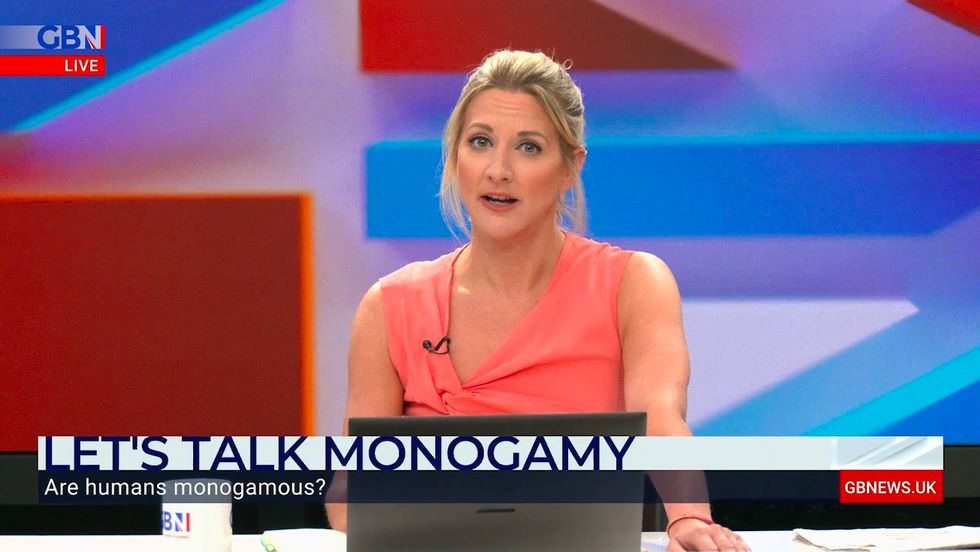Alex Phillips: We need to talk about monogamy

Alex Phillips | GB News

By Alex Phillips
Published: 27/08/2021
- 16:17Updated: 27/08/2021
- 18:40We're hanging on to the remnants of last century’s mores while transitioning to something entirely new that perhaps we are neither ready for, nor capable of.
Don't Miss
Most Read
Latest
Love and marriage, love and marriage, go together like a horse and carriage, this I tell you, brother, you can’t have one without the other.
Frank Sinatra’s lyrics resonate with a mawkish romanticism of the past, but the sentiment behind them really hasn’t changed.
Look at any ballad today and the message is clear; Be My One And Only, Everything I do, I do it for you, Give your all to me, I’ll give my all to you. You get the picture. And while social attitudes towards sex before marriage have radically changed, those relating to extra marital sex after taking vows haven’t budged an inch.
Infidelity is still a major cause of relationship breakdown. Monogamy has stood the test of time, but rather than be one permanent lifelong structure, it has been hewn into a sequential and transitory expectation, that is, being faithful to the person you are with at that moment, rather than ensuring that your first partner is also your last. Marriage statistics back that up.
The average age of people getting married has shot up since the 70s from 23, to 38 for men, and 36 for women, a trend largely at odds with female fertility, but betraying a cemented social consensus that fidelity is still the Holy Grail, even if we are taking a lot longer to commit to commitment.
Throughout history and around the world, marriage established itself as a social and political tool, rather than a romantic one. Tribes intermarried offspring to secure peace, Kings betrothed Princes to Princesses, in fact, right up until the fin de siecle, anyone reading Austin or Bronte understands that marriage was often more about class, financial security and lineage, rather than love. Even our own Royal Family had issues with divorce right up until the 80s. Times are changing, and rapidly.
The two world wars ushered in perhaps the greatest tipping point: feminism. Women were needed on the front lines, in factories and on farms, removing them from the kitchen and recalibrating marriage beyond a construct of mutual convenience between men and women to something anchored in romance, choice and ideals, vested in expectations often impossible to meet.
As love marriages became the standard, divorce rates began to rise. At the start of this millennium, it feels as though we are once again in flux, hanging on to the remnants of last century’s mores while transitioning to something entirely new that perhaps we are neither ready for, nor capable of.
Our obsession with finding the ideal partner sees people swiping left and right and paying into the 12 billion pound dating industry to try to find their perfect match - a concept frankly risible a century ago, and perhaps an indication that what we are seeking to underpin monogamy with could largely a slippery illusion.
Rather than trying to construct a concrete nuclear family, we are now endlessly trying to complete ourselves, by seeking our other half, a project that for many is doomed to failure.
Social norms are changing in a world that has pivoted towards individualism and instant gratification and away from organised religion and Victorian concepts of chastity.
More people are entering open relationships, polyamory and polygamy or longterm celibacy or singledom. In truth, it can feel like the established expectation of monogamy is actually at odds with the modern world. So why do we still cling to it?
Is there a biological, sociological or psychological imperative baked into the human condition? After all, despite many world religions openly advocating polygamy in ancient texts, culturally around the world the paradigm of a happy husband and wife has become an international norm. But is the normative, normal? Are humans really adapted to mate for life?
As we become a more multicultural society, we have also opened the door to relativism. Polygamy is still practised in Islamic cultures, and in Subsaharan African societies, while the emancipation of the LGBTQ community has challenged the debate on marriage from both sides. Civil partnerships legally extracted matrimony from the Church, while the Church was forced to welcome same sex partnerships.
Yet with increasing numbers of single parent families often highlighted as a root cause of antisocial behaviour, poor mental health and lower educational outcomes, is there an argument to be made for the renaissance of small c conservative values when it comes to love?
Today, we really need to talk about monogamy.










